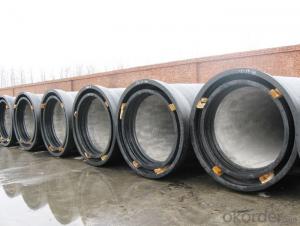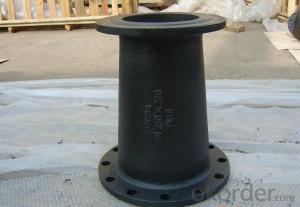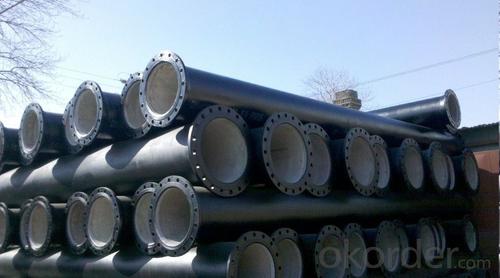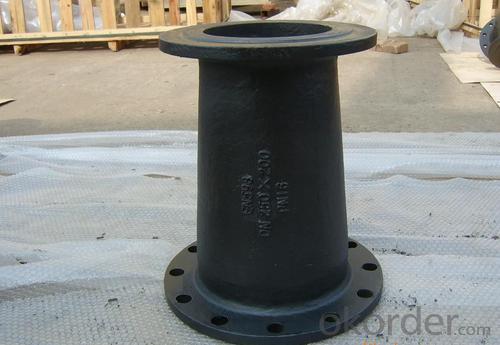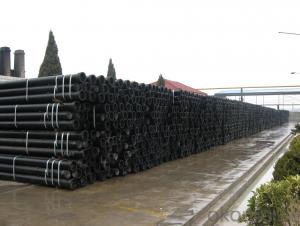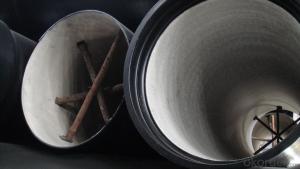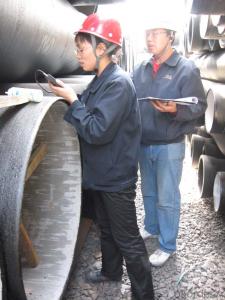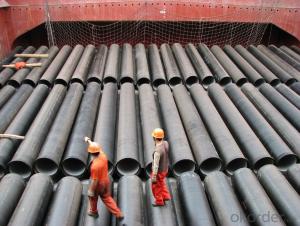Ductile Iron Pipe On Sale Made In China DN80
- Loading Port:
- Tianjin
- Payment Terms:
- TT OR LC
- Min Order Qty:
- 1000 m
- Supply Capability:
- 10000 m/month
OKorder Service Pledge
OKorder Financial Service
You Might Also Like
1.Packaging & Delivery
Packaging Detail: | DN80-300 bundled with steel belt ( the bundle size see the product detail part) DN400-1200 are in bulk |
Delivery Detail: | at least 5days for MOQ |
2.Specifications
Ductile iron pipe comply with ISO2531/EN545
1)We are factory
2)Best quality
3)Competive price
4)On time delivery
3.Features:
Facilitating high resistance to loadings, pressure and vacuum with high tensile strength,
Enabling high resistance to corrosion,
Not requiring cathodic protection,
Less operating cost since cast pipes have larger nominal diameter than polyethylene pipes.
Being the best pipe in case of an earthquake, with its ability of resilience and resistance to impacts without deformation,
Long product life, exceeding 50 years,
Preserving the quality of water with healthy interior coating.
4.Applied Standards:
General Design | ISO 2531 |
Internal Lining | ISO 4179 |
External Coating | ISO 8179 |
Polyethylene Coating (Optional) | ISO 8180 |
5.Joint Types:
Push-on Type | TYT Type |
Standard Type |
6. Diameters:
Pipes | Ø80 – Ø1200 mm (L = 6m, and 5.7m) |
Fittings | Ø80 - Ø2200 mm |
7. Wall Thickness:
Pipes | C and K classes |
Fittings | Class K10 - K12 |
8.Test Pressures:
Pipes | for Ø80 - Ø300 mm | 50 bar / 40 bar |
for Ø350 - Ø600 mm | 40 bar / 30 bar | |
for Ø700 - Ø1000 mm | 32 bar / 25 bar | |
for Ø1100 - Ø2600 mm | 25 bar |
Fittings | for Ø40 - Ø300 mm | 25 bar (*) |
for Ø350 - Ø600 mm | 16 bar | |
for Ø700 - Ø2600 mm | 10 bar | |
(*16 bar for fittings with PN10 flanges) | ||
9.Materials:
Pipe | Ductile iron casting, minimum 420 MPa tensile strength |
Internal Lining | Concrete Lining, ISO 4179 |
Socket Internal 10.Lining | 200 micron epoxy coating |
External Coating | 70 micron bitumen coating on 130 gr/m2 zinc coating, ISO 8179 |
Fittings | Ductile iron casting, minimum 420 MPa tensile strength |
Internal Lining | Concrete Lining, ISO 4179 |
External Coating | 70 micron bitumen coating on 130 gr/m2 zinc coating, ISO 8179 |
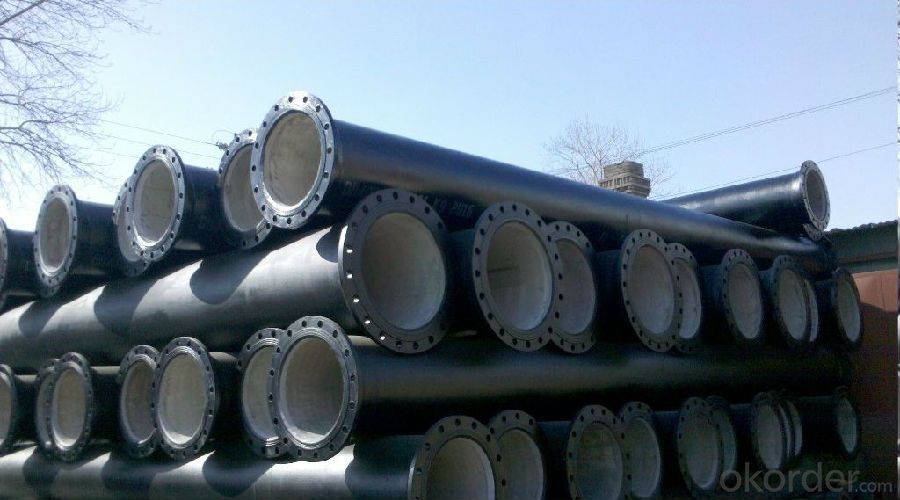
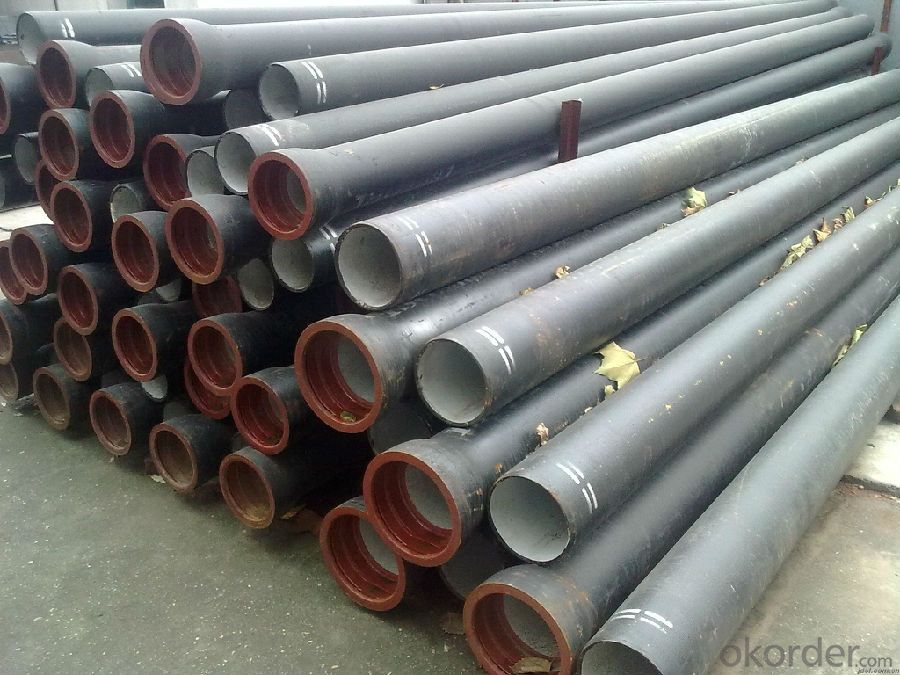
- Q: Can ductile iron pipe be used for both water and sewage applications?
- Yes, ductile iron pipe can be used for both water and sewage applications. It is a durable and versatile material that is resistant to corrosion and can handle the pressure and flow requirements of both water and sewage systems.
- Q: Can ductile iron pipes be used for geothermal systems?
- Indeed, geothermal systems can utilize ductile iron pipes. Renowned for their strength, durability, and resistance to corrosion, ductile iron pipes prove fitting for diverse applications, including geothermal systems. With the ability to withstand elevated temperatures and fluctuations in pressure, commonly encountered in geothermal systems, these pipes excel. Moreover, they possess exceptional thermal conductivity, facilitating efficient heat transfer between the geothermal fluid and the surrounding environment. Consequently, ductile iron pipes represent a feasible choice in transporting geothermal fluids within geothermal systems.
- Q: Maximum pipe diameter of ductile iron pipe
- The maximum diameter of ball milling cast iron pipe can be DN3000.. For long pressure pipeline, the performance of ball milling cast iron pipe is better than that of PCCP tube, and the performance is reliable, safe and stable!
- Q: How many degrees can the ductile iron pipe be each?
- Minimum tensile strength: 420/Mpa, minimum yield strength: 300/Mpa, minimum elongation 7%.
- Q: Do ductile iron pipes require internal linings or coatings?
- Yes, ductile iron pipes typically require internal linings or coatings in order to prevent corrosion and extend their lifespan.
- Q: What is the expected maintenance for ductile iron pipes?
- The expected maintenance for ductile iron pipes involves regular inspections and preventative measures to ensure their longevity and optimal performance. Firstly, it is important to conduct routine visual inspections to identify any signs of corrosion, leaks, or other forms of damage. Inspecting the external surface for any signs of cracks, rust, or discoloration can help detect potential issues early on. Furthermore, periodic cleaning of the pipes is necessary to remove any debris or sediment buildup that may obstruct the flow of water. This can be achieved through flushing the pipes or using mechanical cleaning methods. Additionally, it is crucial to regularly check and maintain the protective coatings on the pipes, such as linings or external paints, to prevent corrosion and maintain their structural integrity. In terms of preventative maintenance, implementing a comprehensive corrosion control program can significantly extend the lifespan of ductile iron pipes. This can involve the application of corrosion inhibitors, cathodic protection systems, and periodic re-coating of the pipes. Regular monitoring of water chemistry parameters, such as pH levels and chlorine content, can also help prevent corrosion and extend the life of the pipes. Lastly, it is essential to keep accurate records of maintenance activities, including inspections, cleaning, and repairs, to track the condition of the pipes over time. This enables proactive planning for future maintenance and replacement needs, ultimately ensuring the efficient and reliable functioning of ductile iron pipes.
- Q: Can ductile iron pipe be used for wastewater treatment plant sludge dewatering?
- Yes, ductile iron pipe can be used for wastewater treatment plant sludge dewatering. Ductile iron pipe is known for its durability and corrosion resistance, making it suitable for applications in wastewater treatment plants. It can effectively handle the sludge dewatering process and provide reliable performance for long-term use.
- Q: Can ductile iron pipe be used in high-pressure applications?
- Yes, ductile iron pipe can be used in high-pressure applications. Ductile iron pipe has excellent tensile strength and is capable of withstanding high pressure levels. It is often used in water and wastewater systems, as well as in oil and gas pipelines where high-pressure conditions are present.
- Q: How much is the installation fee of the 400 largest ductile iron pipe?
- Compared with the PE pipe, from the installation time, ductile pipe PE pipe installation is simple and rapid, and after the installation of internal and external pressure bearing better tightness and corrosion resistance; from the point of view, ductile pipe sealing better after installation, but also can improve the corrosion resistance through various anti-corrosion methods;
- Q: Are ductile iron pipes suitable for horizontal directional drilling?
- Yes, ductile iron pipes are suitable for horizontal directional drilling due to their high strength and flexibility, which allows them to withstand the stress and bending forces during the drilling process.
Send your message to us
Ductile Iron Pipe On Sale Made In China DN80
- Loading Port:
- Tianjin
- Payment Terms:
- TT OR LC
- Min Order Qty:
- 1000 m
- Supply Capability:
- 10000 m/month
OKorder Service Pledge
OKorder Financial Service
Similar products
Hot products
Hot Searches
Related keywords

